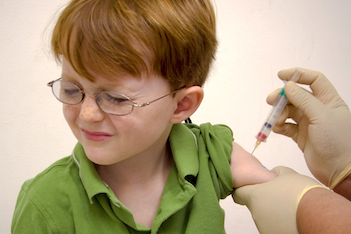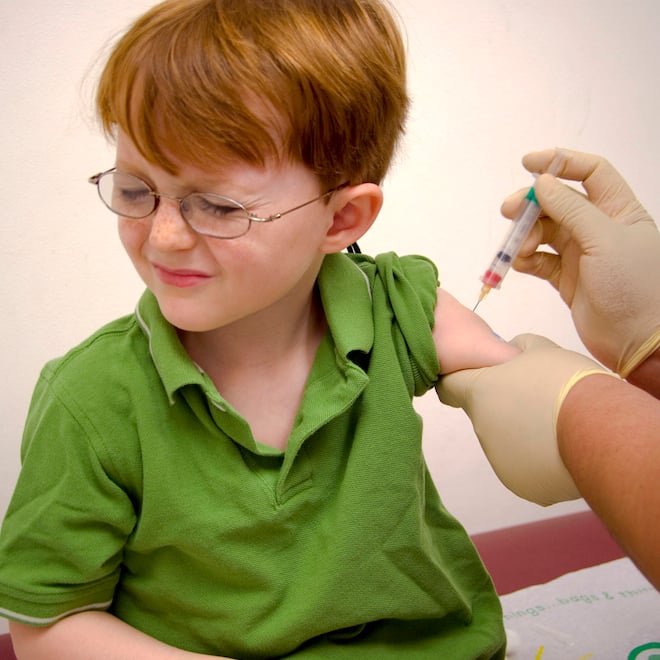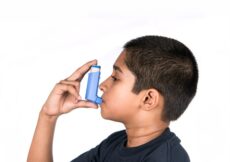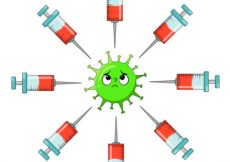Follow these simple dos and don’ts to make getting shots more comfortable for your child.
Photo: iStock
As parents, when our kids get a vaccination, it’s easy to brush off their fears. “It’ll just be a little poke,” we’ll say. The truth is, shots can really hurt—both the initial needle and a sore arm afterwards. Rather than skirting the issue, it’s better to address the fear—and the pain—head on.
“For kids who have a needle phobia or a lot of anxieties, we have to really acknowledge those and prepare in advance,” says Anne Wormsbecker, a paediatrician at Unity Health Toronto.
The good news is, there’s lots of research-based ways that you can make shots hurt less for your kids. Here are the best ways to prepare your kid for the shot and how to minimize pain and anxiety throughout the process.
Talk to them about the benefits
Although it’s true your kid probably won’t love getting a needle, don’t harp on the negatives, suggests Wormsbecker. Instead, tell them about how vaccines can keep themselves healthy and how they’ll be protecting others as well.
Tell them what to expect
While you don’t want to warn your kid for days in advance that they might feel some side effects, you should give them a bit of a head’s up about the process (even the morning of the appointment), and tell them what they can expect during and after the vaccination. “You don’t want it to be a total surprise to them, but at the same time, you don’t want to give them an opportunity to build it up and imagine more than it’s going to be,” explains Wormsbecker.
Pick up a topical anaesthetic cream or patch in advance
These products can numb the skin so kids don’t feel the poke as much. “Parents can buy this over the counter,” says Christine Chambers, a clinical psychologist and scientific director at Solutions for Kids in Painin Halifax. You’ll need to know where the needle is going on the body, and it needs to be applied to the skin 30 to 60 minutes ahead of time. Chambers recommends asking the pharmacist to help show you how to put it on.
Breastfeed your baby before or during the shot
Parents who breastfeed are lucky to have this secret weapon at their disposal. And all parents should hold very young infants skin-to-skin during their vaccines.
Use distraction tools
“We’re so lucky in the 21st century, we have phones, we can access WiFi, or use our data, to pull out a video of their favourite song or favourite show to distract them,” says Wormsbecker. Deep breathing, blowing bubbles at them, having them look at book or toy or talking to them about something they like are other good distraction techniques. You could even ask them to look out a window or count dots on the wallpaper.
Don’t give your child an oral pain reliever, such as acetaminophen or ibuprofen, before the shot
“A lot of parents think that giving oral pain medications like Tylenol or Advil will help, but they don’t reduce the pain and some research suggests they may interfere with the efficacy of [certain] vaccines,” says Chambers. You can give pain medication after the shot, though.
Feel free to ask the healthcare provider about pain management. Chambers suggests asking, “What are you going to do to help my child with pain during this procedure?”
Don’t massage the injection site, either
There is no evidence or recommendation related to massaging the injection site after, so it not recommended, says Chambers.
Give your child something to look forward to after the shot
“With any negative experience, giving your child something positive to look forward to can change the event,” says Chambers. Let them know well in advance how you’re going to celebrate—whether they get to watch a show when you get home or you’ll be stopping for a tasty treat.
Don’t overly reassure your child.
“Parents say ‘It’s okay, it will be over soon,’” says Chambers, “but study after study has shown that using that type of reassuring language actually makes the pain feel worse.” Research shows that when you tell a child everything is okay, he actually assumes you’re worried about what’s going to happen. “Use neutral language,” suggests Chambers. Before you know it, the vaccination will be over and you can all enjoy that reward.




































